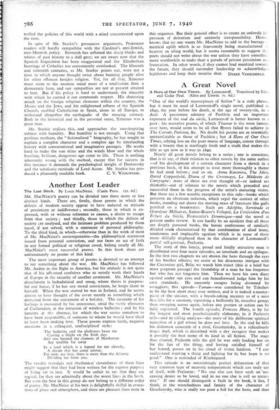Another Lost Leader
distinct kinds. There arc, firstly, those poems in which the defects of modern society appear to have induced an attitude of pessimism or indifference ; secondly, those in which is ex- pressed, with or without reference to causes, a desire to escape from that society ; and thirdly, those in which the defects of society sre analysed, and the intimate problem produced by them laced, if not solved, with a statement of personal philosophy.
To the third kind, in which—otherwise than in the work of most of Mr. MacNeice's contemporaries—the philosophical statement issued from personal conviction, and not from an act of faith in any formal political or religious creed, belong nearly all Mr. MacNeice's most successful poems. In this book there are unfortunately no poems of this kind.
The most important group of poems is devoted to an attempt to say something about the war. Mr. MacNeice has followed Mr. Auden in the flight to America, but his attitude is not quite that of his affronted confreres who so noisily wash their hands of Europe in the security of another continent. Mr. MacNeice's detachment is lackadaisical and smug, where theirs is purpose- ful and fierce; if he has any moral convictions, he keeps them to himself. When the war started he was in Ireland, and he seems almost to have thought of the event merely as something which detracted from the enjoyment of a holiday. The intensity of his feelings is measured by his annoyance, amid the rustic pleasures of Cushendun, at the intrusion of wireless bulletins ; and by his laments at the absence, for which the war seems somehow to have been responsible, of someone to whom he would have liked to have been making love. These poems express facile, negative emotions in a colloquial, undisciplined style : The bulletins and the gladiators beset me Casting a blight on the Irish day, And you beyond the clamour of Manhattan Are terribly far away In a land which is a legend for me already, A dream that has come untrue, For now, my love, there is more than the Atlantic Dividing me from you.
The tawdry nostalgia and rhythmical slovenliness of these lines might suggest that they had been written for the express purpose of being set to jazz. It would be unfair to say that they are typical, for they are admittedly about the worst lines in the bock. But even the best in this group do not belong to a different order of poetry. Mr. MacNeice at his best is delightfully skilful in evoca- tions of place and atmosphere, and there are pleasant lines even in
this sequence. But their general effect is to create an unlovely ill; pression of defeatism and untimely irresponsibility. Heave. knows that no one wants Mr. MacNeice to add to the barrage metrical uplift which is so fearsomely being manufactured t hearten an ailing world, but it seems reasonable to suggest th poets should not write about the war unless they have somethu, more worthwhile to make than a parade of private pessimism an., frustration. In other words, if they cannot lead mankind towar, the future, they should surrender leadership to acknowledge legislators and keep their mouths shut. DEREK VERSCHOYLE.


































 Previous page
Previous page